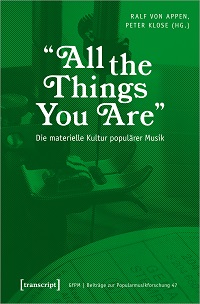Türkische Popmusik und Gesellschaftsanalyse
Anatolian Pop Music: 'Rurban' Images of a Period

In einem Buchbeitrag hat HdM-Professor Oliver Zöllner zusammen mit drei Kolleg:innen die bis in die Gegenwart prägende und weltweit rezipierte türkische Popmusik (Anadolu Pop) der 1960er und 1970er Jahre im Kontext zeitgenössischer gesellschaftlicher Veränderungen in der Türkei analysiert. Die vier Autor:innen analysieren Bilddokumente des Musikgenres, vor allem Plattenhüllen und werbliche Begleitmaterialien aus türkischen Musikzeitschriften; ebenso stellen sie türkische Kinoposter vor, deren Kostümausstattung für viele der "Anadolu Pop"-Interpret:innen Vorbild war. Außerhalb der Türkei (und oft sogar im Land selbst) sind die gesellschaftlichen, kulturellen und politischen Bezüge dieser Musik meist unbekannt oder zumindest unbewusst; sie wirken aber bis heute nach.
Die englischsprachige Publikation arbeitet den 'rurbanen' Habitus der anatolischen Popmusik heraus, also die Überlappungen und Transformationen von ländlichen (ruralen) und städtischen (urbanen) Formen, die für die Türkei und ihre vielfältigen Modernisierungsprozesse in den 1960er und 1970er Jahren so zentral waren. Methodisch basiert der Beitrag auf der Wissenssoziologie (Karl Mannheim, Ralf Bohnsack) und arbeitet den 'Habitus' (Pierre Bourdieu) heraus, der sich in den analysierten Bilddokumenten findet. Der Buchbeitrag ist die stark erweiterte Ausarbeitung eines Vortrags, den die Autor:innen 2021 auf der 31. Jahrestagung der Gesellschaft für Popularmusikforschung (GfPM) an der Technischen Universität Dortmund gehalten haben. Cornelia Lund lehrt an der Hochschule für Künste Bremen, Holger Lund ist Professor für Mediendesign an der DHBW Ravensburg, Berrin Yanıkkaya ist Dekanin der Faculty of Arts and Sciences der Yeditepe Üniversitesi, İstanbul, und Oliver Zöllner lehrt im Studiengang Digital- und Medienwirtschaft an der HdM Stuttgart.
ABSTRACT:
This article seeks to analyse the images that accompany the hybrid musical genre of the 1960s and 1970s called Anatolian Pop in Turkey. The unique characteristic of this musical style is twofold; firstly, it stems from the polycultural nature of the genre as it brings together European, Mediterranean, Arabic, Balkan, and other post-Ottoman 'musicscapes' (drawing on Appadurai 1996), and secondly, it blends rural and urban elements up to a point that can be called 'rurban', a term adopted from urbanism. The latter also needs to be examined in the context of migration flows from rural Anatolia to larger cities mostly in the West of Turkey. Anatolian pop music developed in a globalising-localising context, a 'liminal' place and space of both domestic and international cross-cultural communication.
The rurban character of Anatolian Pop is for one part present within the music, but also in its materiality, most prominently in the metamorphosis of the rural lute saz into an electrified urban rock instrument. Rurbanity is, however, equally inherent in the images produced alongside this music: for record covers, magazines and films that show musicians, fashion garments, accessories, and instruments. These images can be read as documents of particular social, temporal and/or spatial relationships, and can thus be analysed in the context of the sociology of knowledge.
Mainly based on a sample of 1970s Turkish weekly pop-culture magazine Hey, the article examines how the interplay of rurban fashion and music works, and how these discourses were framed in the photographic images. The authors also investigate the visual and discursive links between the kostüme avantür (Costumed Adventure) films of the period and Anatolian pop music. Thus, the objective of this analysis is to uncover the incorporated habitus of the period, i.e., the sometimes unconscious and unreflected patterns of behaviour and valuation in a society (Bourdieu 2014).
*****
Cornelia Lund, Holger Lund, Berrin Yanιkkaya & Oliver Zöllner (2023): "Anatolian Pop Music: ›Rurban‹ Images of a Period". In: Ralf von Appen & Peter Klose (eds.): »All the Things You Are« - Die materielle Kultur populärer Musik (= Beiträge zur Popularmusikforschung, Bd. 47). Bielefeld: transcript Verlag, pp. 111-138. DOI: 10.14361/9783839470107-006 | Zugriff über die HdM-Bibliothek unter https://ebookcentral.proquest.com/lib/hdm-stuttgart/detail.action?docID=7281642
Erschienen in:
'All the Things You Are' - Die materielle Kultur populärer MusikAuf den Seiten: 111-138
Autoren: Lund, Cornelia / Lund, Holger / Yanιkkaya, Berrin / Zöllner, Oliver
Hrsg.: Ralf von Appen und Peter Klose
Erscheinungsjahr: 2023
Verlag: transcript
Ort: Bielefeld
Weiterführende Links:
Verlagsvorschau auf den Beitrag
Autoren
- Name:
- Cornelia Lund
- Name:
- Holger Lund
- Name:
- Berrin Yanιkkaya
- Name:
-
Prof.
Dr. Oliver Zöllner

- Forschungsgebiet:
- Digitale Ethik, Empirische Medienforschung, Soziologie der Medienkommunikation, Public Diplomacy
- Funktion:
- Professor
- Lehrgebiet:
- Medienforschung, Soziologie der Medienkommunikation, Digitale Ethik, Public Diplomacy, Nation Branding, Hörfunkjournalismus
- Studiengang:
- Medienwirtschaft (Bachelor, 7 Semester)
- Fakultät:
- Fakultät Electronic Media
- Raum:
- 216, Nobelstraße 10 (Hörsaalbau)
- Telefon:
- 0711 8923-2281
- Telefax:
- 0711 8923-2206
- E-Mail:
- zoellner@hdm-stuttgart.de
- Homepage:
- https://www.oliverzoellner.de
Eingetragen von
Mehr zu diesem Autor

